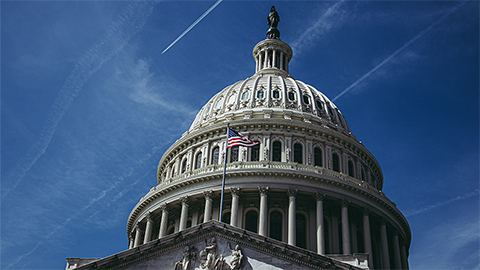Congress passes, considers bills promoting diversity in STEM
While Congress is often characterized by partisan gridlock, late last year it passed legislation that creates and expands STEM education initiatives at the National Science Foundation, and it is considering a bill that would improve the quality of undergraduate STEM education at minority-serving institutions.
The Building Blocks of STEM Act, signed into law by President Donald Trump in December after rare bipartisan cooperation in both chambers, instructs the NSF to equitably allocate funding that supports greater inclusion in early childhood and elementary STEM education. With an eye to improving female participation in science technology, engineering and math, the act also directs the NSF to support research on the factors that discourage or encourage girls to engage in STEM activities.
The MSI STEM Achievement Act, meanwhile, directs the NSF to allocate funds for capacity building at tribal and historically black colleges and universities as well as minority-serving institutions. Based on a late 2018 report by the National Academies of Sciences, Engineering and Medicine, which indicated minority-serving institutions are underutilized resources that can boost the nation’s science and technology workforce, this legislation would direct the Government Accountability Office to create an inventory of competitive funding programs that specifically target minority institutions to diversity the STEM workforce. The bill already has passed the House and is under consideration by the Senate.
The American Society for Biochemistry and Molecular Biology is a member of the STEM Education Coalition, which advocates for “targeted initiatives to promote the inclusion of underrepresented minorities, women, and other high-need populations in STEM fields.” Over the past year, the coalition has advocated for both of the bills.
While these two pieces of legislation are important catalysts for dialogue on what policies are needed to create institutional change to promote a diverse and inclusive STEM workforce, there is still more to this conversation—including sexual harassment in STEM, stereotype threats, and poor advising.
The ASBMB will continue to advocate for passage of the MSI STEM Achievement Act and other bills aimed at creating and supporting a diverse scientific workforce.
Enjoy reading ASBMB Today?
Become a member to receive the print edition four times a year and the digital edition monthly.
Learn moreGet the latest from ASBMB Today
Enter your email address, and we’ll send you a weekly email with recent articles, interviews and more.
Latest in Policy
Policy highlights or most popular articles

Women’s health cannot leave rare diseases behind
A physician living with lymphangioleiomyomatosis and a basic scientist explain why patient-driven, trial-ready research is essential to turning momentum into meaningful progress.

Building a stronger future for research funding
Hear from Eric Gascho of the Coalition for Health Funding about federal public health investments, the value of collaboration and how scientists can help shape the future of research funding.

Councilors advocate for science on Capitol Hill
ASBMB Councilors meet with their elected officials to advocate for basic scientific research funding and training the next generation of scientists.

Hope for a cure hangs on research
Amid drastic proposed cuts to biomedical research, rare disease families like Hailey Adkisson’s fight for survival and hope. Without funding, science can’t “catch up” to help the patients who need it most.

Supporting science through advocacy and community building
ASBMB calls on scientists to take action as funding cuts and policy shifts threaten the U.S. research enterprise, emphasizing the power of community advocacy and persistence in protecting the future of science.

Seven steps to advocating in your home state
Find out how to schedule, prepare for and conduct a productive district office meeting to communicate the importance of fundamental scientific research funding to your representatives.


